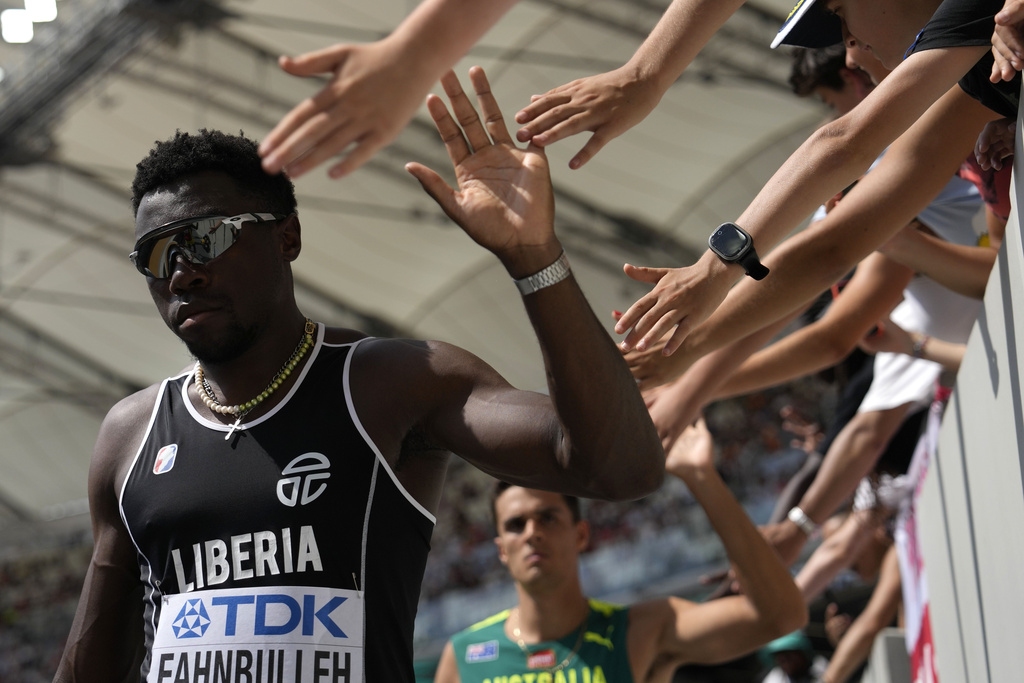
Hopkins grad Joseph Fahnbulleh now treats track like a business. The Olympic objective: Medal in the 200
Joe Fahnbulleh had just run the relay leg of a lifetime. He never got the split, but is confident he ran the anchor of the 4×100 relay in fewer than nine seconds to pass a number of nations at the World Athletic Relays and deliver a second-place finish in the semifinal for Liberia to lift the nation to the Olympic Games.
“That was fun,” Fahnbulleh recalled.
He returned to practice the following Monday and was greeted by his coach, who first said “Good job,” and quickly followed up with a “but move on.”
“And I said, ‘Yes sir,’” Fahnbulleh recalled.
That’s the life of a track and field athlete. There simply isn’t time to revel in your successes. Because someone else is always coming behind you. It’s a harsh realization the 2019 Hopkins grad has made over the past three years.
He arrived at the 2021 Olympics in Tokyo as a bright-eyed 19-year-old with “nothing to lose.”
“But everything to gain,” Fahnbulleh said. “So I was just running out there for pure fun. Just pure fun.”
Now, at the age of 22, that’s no longer the case for Fahnbulleh, who will open his Olympic Games with the first round of the men’s 200 meters on Monday at 12:55 p.m. Central before competing for Liberia in that 4×100 relay starting Aug. 8.
“I’ve got things to lose now,” he said.
Such as contracts and partnerships. Fahnbulleh noted deals are re-signed often after the Olympics. Those are often based on results.
“Track and field is not for effort. Track and field is determined on the new flavor of the month,” Fahnbulleh said. “And with these new young kids coming up, they can take your dang money, because they want the hype, they want this, they want that.”
Fahnbulleh noted it’s easy to get lost in a crowd, particularly when the crowd size is massive. The Olympics are a chance for sprinters like Fahnbulleh to remind folks he’s still here.
There’s also pressure in that. But that’s fine. The 22-year-old is used to it, noting pressure was inherent when he ran for Florida, a perennial powerhouse, in college.
“It comes with the territory of you being good,” Fahnbulleh said. “There’s pressure outside on the field, but we train to break through the pressure. If you feel pressure, you’re unprepared. Pressure is also a privilege, because that means you deserve to be there. It’s always a double-edged sword as far as how you play it. It’s really how you play it and how you look into it.”
Fahnbulleh is built to handle it all. That’s why he’s on this stage.
After finishing fifth in the 200 meters in Tokyo, he enters the Paris Games ranked No. 11 in the world in the event.
Between the two Olympics, Fahnbulleh doubled up at the NCAA Outdoor Championships in 2022 in the 100 and 200 meters, and did the same at the African Championships earlier this year.
He noted he’s more experienced and seasoned this time around. The “wow” factor of competing in the Olympics is gone. He’s no longer in awe of the other athletes strolling through the village.
“I’m coming into it as, ‘Alright, cool. I’ve got three rounds, and let me get out of Dodge,’ ” Fahnbulleh said.
Very business-like. But amid the professionalism of the sport, Fahnbulleh admitted it can be difficult to keep it fun.
“The fun comes in winning, because that’s fun. That’s always fun. But then the fun comes in what you do outside of practice, and how you can handle yourself outside of practice to keep that joy,” he said. “Because it’s not like a sport where you can have a bad game, you can be somewhat mediocre, but you have three games in a week. You have like two races in two weeks or two races in two months. Just trying to keep it fun with outside factors. But once you’re in it, you just have to keep the ball rolling, no matter what happens.”
He’s motivated to do so by the financial implications. Fahnbulleh wants to win to set up his future family, as well as his mom.
“I’m not doing this just to be out here having fun, for real, all the time,” Fahnbulleh said. “I’ve got to go execute and I’ve got to go to work. So every morning, I wake up, I thank the Lord for waking me up and then I go to work.”
There is also an internal drive to be great. That sparks his goals for these Olympics — to medal in the 200.
“I didn’t train as hard, and I didn’t bust my (butt) as hard all year just to be like, ‘Oh yeah, I’m in the finals.’ That was never the goal in fall training. That was never the mindset in fall training,” Fahnbulleh said. “The mindset was, ‘You’re going to get top three. No matter if you have to rip your hammies off the bone, you’re going to get top three.’ ”
Related Articles
St. Paul’s Emmanuel Matadi’s 100-meter Olympic run ends in semis
Lakeville’s Regan Smith wins another gold in medley relay, leaves Paris with 8 career Olympic medals
Olympics TV schedule for Sunday, Aug. 4
Olympics: St. Paul gymnast Suni Lee adds bronze medal on uneven bars
Lakeville’s Regan Smith wins first gold after swimming prelim leg for U.S. mixed medley relay

